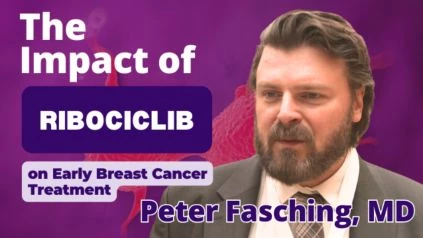In a recent interview, Peter Fasching, MD, Professor of Women’s Cancer Specialist at the University Hospital in Erlangen, Germany, discussed the findings from the NATALEE trial, focusing on the role of ribociclib in reducing the risk of cancer recurrence in early breast cancer patients while maintaining their quality of life. Dr. Fasching explained that ribociclib is a CDK4/6 inhibitor that can halt the cell cycle and send cells into senescence, making it a promising treatment option for early breast cancer patients.
The Natalie trial, which involved over 5,000 patients, revealed that adding ribociclib to standard endocrine treatment resulted in a significant reduction in the risk of recurrence. The study demonstrated a 25.2% relative risk reduction and a 3.3% absolute benefit at three years. Dr. Fasching emphasized the importance of this treatment approach for women at an increased risk of recurrence, particularly in the adjuvant setting.
Furthermore, Dr. Fasching highlighted the significance of maintaining the health-related quality of life for patients undergoing treatment. Despite the slightly increased toxicity profile associated with ribociclib, the trial showed that quality of life was not adversely affected. Ensuring that patients tolerate and adhere to therapy is crucial for its long-term effectiveness.
The interview also touched on ongoing analyses of the Natalee trial, which will provide further insights into the treatment’s impact on various patient subgroups and the potential benefits of ribociclib in the adjuvant setting. Overall, the findings from the NATALEE trial offer promising prospects for improving outcomes in early breast cancer patients while maintaining their quality of life during treatment.

